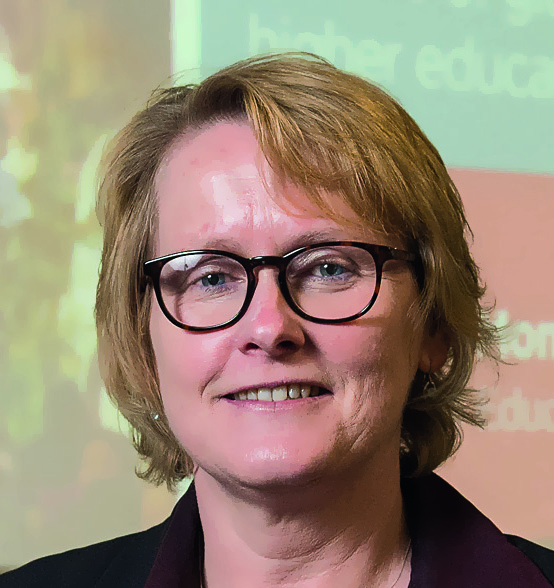International doctoral knowledge and the future of cross-border academic mobility: perspectives from digital scholarship
- Catherine Montgomery, Durham University
Event Materials
This event is now archived and we are pleased to provide the following event media and assets, along with the original event overview.

Internationally mobile doctoral students play a crucial role in enabling globalised universities to generate new knowledge and innovations. These flows of doctoral students, as highly skilled migrants, constitute ways to create knowledge across and within certain boundaries. In this presentation I will construct doctoral student mobility as knowledge generation and explore the ways in which this form of knowledge mobility might become an increasingly significant part of future cross-border mobility.
The paper rests on a two-year funded ESRC impact project examining international doctoral research as a coherent body of knowledge. Using the British Library’s digital repository EThOS, a collection of up to 500,000 doctoral studies carried out in British universities, the research analyses the theoretical, methodological and practical impact of international doctoral research for social, cultural and community organisations. The exponential development of Artificial Intelligence has presented endless opportunities to mine the digital repositories where doctoral theses are now stored and, most importantly, to synthesise the research and generate summaries and outcomes. This project has developed an AI tool which performs clustering and text summarisation that could enable users to easily access and utilise the research of the EThOS collection without the need for laborious manual sifting through its extensive repository. This could enable international doctoral knowledge to cross borders in a myriad of different ways. The presentation will discuss this work in the context of future cross-border transnational mobilities, acknowledging international doctoral research as marginalised, ‘Southern knowledge’ (to use Raewyn Connell’s now widely employed term) embedded in global divisions and long-standing patterns of inequalities in power, wealth, and cultural influence. At the same time, it can be argued that internationally mobile doctoral students are part of privileged mobile networks which characterise their knowledge creation as part of a future transnational elite. Against these complexities, the presentation explores the future of doctoral knowledge as transnational mobility, augmented by artificial intelligence.
About the CGHE webinar series on ‘The future of cross-border academic mobility’
In the last three decades there has been a tremendous advance in global connectedness in higher education, manifest especially in the flows of ideas and knowledge and the flows of people. According to the UNESCO data cross-border mobility has grown by a remarkable 5.65% per year since 1998 (see graph). It is especially important among graduate students: in the OECD countries in 2020, 14% of Masters enrolments and 24% of doctoral students were ‘international’ or ‘foreign’. In the first year of the pandemic in 2020, despite disruptions to travel and the tight regulation of inward movement in many countries, a record 6.4 million students crossed national borders to access degree programmes for one year or more. There is also a high volume of student movement for shorter periods, from a few weeks to a semester or more. We lack comparable data on faculty movement, but it is reasonable to assume that cross-border faculty mobility for both short visits and longer stays has increased at least as rapidly as student mobility. Much academic cooperation takes place online, but the collaborative relationships are typically established though conferences and face-to face project work. Friendly relations and immersion in cross-cultural experiences greatly facilitate practical cooperation.
Though we are still waiting on the data for 2023, it seems that robust growth of student mobility has resumed following the end of travel restrictions. Despite predictions during the pandemic of fundamental changes, with online education and new destinations expected to partly displace established patterns of student movement, the earlier patterns have largely resumed, even though the role of online delivery has grown. There is continued high demand for access to USA and UK, resuming their role as the ‘whitest of the white’, the global centres that attract investment in Whiteness as a portable cultural and economic attribute as was memorably discussed by Riyad Shahjahan and Kirsten Edwards in a paper in Higher Education in 2022. Australia is approaching its pre-pandemic enrolment level, and Canada continues to grow as a student destination. There is pronounced intra-regional travel within Europe supported by European mobility schemes as well as private financing, Germany and France remain major destinations on the world scale and Russia continues its role as a magnet for Central Asian students – though movement from Ukraine into Russia has been largely halted by the Russian invasion of Ukraine. There is a surge of enrolments coming out of India, illustrating its global demographic vitality and continuing its volatility as a student source country (another wave of investigations into migration scam practices in parts of the country is underway). There has also been pronounced growth in movement out of Nigeria and Saudi Arabia. Beyond the Euro-American West, though, inward mobility also continues to expand, and the global academic flows are slowly becoming more plural in terms of power of attraction. Inward movement in China, partly state-subsidised, may now resume its sharp upward trend: prior to the pandemic China had already become a very large student destination country. Regional mobility among countries in East and Southeast Asia continues to grow, and mobility within each of Latin America and Southern Africa is also significant.
Yet the climate is not as easy as it was and the long term is more uncertain than it was. Geopolitics (particularly the tension between USA and China) is slowing or blocking visa processing, for example Chinese doctoral students entering the US universities, and has the potential to slow the growth of cross-border education out of China into other Euro-American countries. There are also signs that Chinese demand for foreign education might be growing more slowly. There is populist pushback against international students in some Western European countries and government ministers continue to problematise education ‘exports’ in UK. Another set of issues has arisen around the ecological effects of plane travel. Work by Robin Shields and others has quantified the ecological impact of flights.
In this series successive presenters will bring their different research lenses to bear on the future of cross-border academic mobility. They will focus not only on trends and patterns in global, regional, national and local mobility but also on the many educational, cultural, institutional and policy issues that arise. These include the experiences and self-formation of mobile students and their agency/identity; their welfare as non-citizens and their encounters with discrimination; links between academic mobility and migration, and also the implications of academic mobility for internationalisation at home.
You need to register individually for each webinar in the series. You can register for the other webinars in the series here.
Event Materials
This event is now archived and we are pleased to provide the following event media and assets, along with the original event overview.
Booking
You will need to register to join this webinar. Please register here


